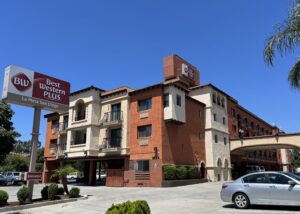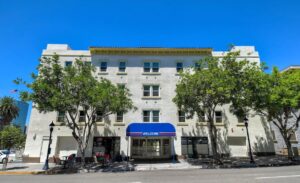Appraisal Meant to Determine if Housing Commission Overpaid for Pandemic-Era Hotel Can’t Answer That Question
Appraisal Meant to Determine if Housing Commission Overpaid for Pandemic-Era Hotel Can’t Answer That Question
by Andrew Keatts | March 17, 2023
It didn’t answer the question.
The San Diego Housing Commission released to the City Council Thursday the new appraisal of a Mission Valley hotel it bought to turn into housing for formerly homeless people.
Nearly three years ago, the Housing Commission acquired the property for $67 million with the help of a broker who, the agency later learned, bought 40,000 shares in the company that sold the hotel before he identified it as a target and negotiated the purchase price.
The controversy immediately raised the question: Did the city overpay for the hotel that was purchased under the cloud of a conflict of interest-scandal?
That’s because of the original purchase appraisal. The appraiser determined the value of the hotel as though it was February 2020. But the city bought the hotel in August 2020, after Covid-19 completely shut down the tourism industry.
Why Housing Commission officials would backdate the appraisal and what the hotel would have been worth if they had not has been unclear.
After the broker faced a lawsuit from the city for his alleged conflict of interest and the scandal set in, the Housing Commission set in motion a new appraisal to clear it all up.
But that second appraisal ended up answering a different question: What would the hotel have been worth if it had not been a hotel.
Here’s the background: The Housing Commission bought two hotels in August of 2020, as part of a state program intended for cities to buy hotels that were distressed because of government-mandated travel restrictions that pummeled the hospitality industry, then convert them into housing.
San Diego bought a hotel in Kearny Mesa and another in Mission Valley, but the Housing Commission’s broker had only invested in the Mission Valley seller.
One appraiser, CBRE, determined the value of both properties. Except CBRE backdated the appraisal for the Mission Valley property to February of 2020, before the onset of the Covid-19 pandemic, while it determined the value of the Kearny Mesa hotel in August of 2020, after the pandemic hit and concurrent with the acquisition.
Housing Commission officials have never said why the appraisals were handled differently, or who made that decision.
The new report offered a chance to answer whether the Mission Valley hotel was worth the $67 million purchase price, as its appraisal suggested, if the original report had followed the same methodology as the Kearny Mesa hotel.
BTI Appraisal completed its follow-up assessment this week. But while it determined what the property was worth in August of 2020 instead of before the pandemic, it made a different, key methodological change that continues to prevent a simple, apples-to-apples comparison.
The first appraisal determined what the Hotel Circle property was worth as a hotel. The new appraisal instead determined what it’s worth as market-rate apartments.
That’s critical, because it was a hotel not market-rate apartments when the Housing Commission bought it. It had neither been converted to market rate apartments, nor was it being sold as market-rate apartments and those would have been worth more. The pandemic hit the hospitality market hardest. The original appraisal said as much, in a section highlighting that the backdated appraisal date was significant:
“Market conditions and corresponding values for hospitality properties throughout the country have been materially impacted by the onset of the COVID-19 pandemic,” it read.
By not treating the property as a hotel, the new appraisal didn’t include those effects. It concluded that as market-rate apartments, the property was worth $69 million in the summer of 2020 – meaning it wasn’t just worth more than the city paid for it, but also that the appraisal that pretended the pandemic hadn’t occurred had actually understated its value. The first appraisal said it was worth $68.1 million.
Jeff Davis, the San Diego Housing Commission’s interim president and chief operating officer, said the agency did not direct BTI Appraisal to treat the property as market-rate apartments instead of a hotel.
“The original appraisal of the property also was based on what the appraiser determined to be the highest and best use,” he said in an email. “The original appraisal determined the highest and best use was as a hotel. The new appraisal determined the highest and best use was as market-rate apartments. To maintain the independence of the appraisals, SDHC did not provide any direction about what constitutes the highest and best use of the property. The appraiser made that determination independently. All appraisals must be based upon the highest and best use as determined by the appraiser performing the appraisal.”
The direction to value the property at its ideal use proved pivotal.
BTI started with a preliminary assessment of what the property was worth in three different scenarios to figure out what its highest and best use was, Ben F. Tunnell, the company’s chairman, said in an interview with Voice of San Diego. They considered it as a hotel — its use at the time of purchase — and as Section 8 apartments, as the Housing Commission uses it today. It also considered its value as market-rate apartments.
BTI got that idea, Tunnell said, after looking at another recent appraisal that looked at four or five hotel purchases across Southern California, which determined their highest and best use was as Section 8 apartments.
“That raised the question of, is the highest and best use of the hotel properties on Aug. 5 of 2020 was really a hotel, or something different,” he said. “The initial assignment we were given was to determine the highest and best use.”
That preliminary assessment showed they should not value the hotel as if it was a hotel.
“It’s worth the most as market-rate apartments, and the least as a hotel,” Tunnell said.
But that analysis could still be revealing to the outstanding question of whether or not the city overpaid.
“Our value estimate as a hotel, on the date of the purchase, would have been lower than the purchase price,” Tunnell said. “Now, we don’t know how much lower.”
He said his company would have appraised the value as a hotel in August of 2020 if they had been asked to do so.
The company also conducted a second appraisal of the property, determining what it was worth in March of last year, to see how much its value had appreciated since the acquisition.
It said the property would then be worth $88 million as market-rate apartments, although the city operates it not as market-rate apartments, but as Section 8 apartments instead.
That newest appraisal, though, assumed that the property is in the same condition it was nearly three years ago. It relied on the original appraisal’s assessment of the condition of the property.
“The use of this extraordinary assumption would affect the value conclusion presented in this report,” the appraisal reads.
Tunnell said he visited the property and saw that the pool and hot tub from the old hotel had been filled in with dirt, and the fitness center had been converted into offices.
“I just felt that in valuing it in 2022, we were trying to look at what it would be worth without the detrimental conditions of what had occurred as a result of the city’s tenancy,” he said.
Alan Reay, the president of the Atlas Hospitality Group, a firm that sells hotels across the state and analyzes hotel sales, agreed that treating the property as apartments instead of the hotel it was operating as at the time of the purchase increased the property’s value.
“You’re comparing a product type that was 100 percent vacant, by law, to apartments, which had nowhere near the impact that Covid caused to hotels,” he said.
He took exception to appraisal’s explanation for treating the property as market-rate apartments.
The appraisal specifies that the fact that it’s owned by a government entity was a critical factor.
“As is the case with governmental ownership, they would have the ability to use the subject property in any manner they wanted,” it reads. “As such, our client has asked us to appraise the subject property based on its highest and best use as improved, which we have determined to be market rate apartments. Therefore, we have appraised the subject property as market rate apartments.”
Reay said that doesn’t hold up, and he’s never seen an appraisal done that way.
“You can’t appraise that way – you have to appraise market value, not the value for one specific client,” he said. “It’s completely discredited from that approach alone.”
In other words, it is true the San Diego Housing Commission can use the property however it wants, even if it was used at the time of purchase as a hotel. But that wouldn’t be true if the city sold it – the new buyer wouldn’t have the same leeway to use it however it wanted.
“The appraiser isn’t appraising it for their client, they’re appraising it for the market,” Reay said.
Tunnell said his firm specializes in complicated appraisals – other firms refer work to him that they can’t figure out how to handle. This wasn’t an unusual assignment, he said, because it’s common for them to get work on property that has problems.
Despite the appraisal, and the previous appraisal that found multiple recent hotels were worth more as Section 8 apartments than hotels, Tunnell wasn’t ready to say hotel operators were leaving money on the table by continuing to run hotels.
“We haven’t done that kind of market study,” he said.


